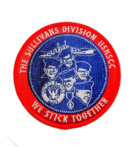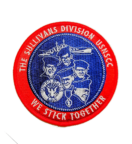
– The Sullivans Division –
The U.S. Naval Sea Cadet Corps is a youth program for young Americans, male and female, ages 13 through 17, whose objectives are to develop an interest and skill in basic seamanship and in its naval adaptations, to train them in seagoing skills and to teach them patriotism, courage, self-reliance and kindred virtues. Cadets train aboard the ships and shore activities of the Navy and Coast Guard, and are authorized by the Secretary of the Navy to wear Navy uniforms appropriately marked with Sea Cadet Corps insignia. There are some 400 units in operation in almost every state in the union as well as Puerto Rico and Guam, with some 6,000 young Americans participating. The Naval Sea Cadet Corps affords equal opportunity for participation to all American youth without regard to race, color, religion or sex.
You are eligible to join if you are 13 years of age or have not reached your 18th birthday.
*For League Cadets you need to be 10 years of age and have not yet reached your 13th birthday.
All prospective cadets must be unmarried, enrolled in school, have parental consent and possess good moral character in addition to being interested in the program and prepared to attend drills regularly.
A medical examination similar to a high school sports physical is required for all cadet applicants to the Naval Sea Cadet Corps (NSCC) or Navy League Cadet Corps (NLCC). No one will be denied admission to the NSCC/NLCC due to a medical disability. Where a medical condition precludes full, unlimited participation, a Request for Accommodation (NSCADM 015) may be presented by the parent or guardian for review so the cadet may participate in NSCC activities to the maximum extent possible.
The Sea Cadets was established by the Navy League of the United States at the request of the Department of the Navy in 1962 to “create a favorable image of the Navy on the part of American youth”.
Today the Sea Cadets continue to further the image of our maritime services by:
-
Developing an interest and ability in seamanship and seagoing skills.
-
Instilling virtues of good citizenship and strong moral principles in each cadet.
-
Demonstrating the value of an alcohol-free, drug-free and gang-free lifestyle.
-
Exposing cadets to the prestige of public service and a variety of career paths through hands-on training with our nation’s armed services.
The mission of the Sea Cadets is to build leaders of character by imbuing in our cadets the highest ideals of honor, respect, commitment, and service.
Yes. A yearly membership is required. This includes paid premiums for the Sea Cadet Group Accident and Health Protection Plan.
Surplus U.S. Navy uniforms are made available to the Naval Sea Cadet Corps. These uniforms, in turn, are made available at a minimal cost. Uniform items, which cannot be met through this source, may be purchased at Navy Exchange Uniform Shops.
Not likely. Sea Cadet units usually meet one evening a week or one weekend per month during the school year. Training away from home is usually conducted only during school vacation periods.
Sea Cadets study a broad range or subjects. Some are designed to help them to become better citizens. They study naval history, customs, and traditions, seamanship, navigation and similar subjects which would improve their chances for success, should they decide to join one of the sea services.
Promotion within the Sea Cadets is based on merit. Promising young men and women, upon filling certain qualifications and requirements, are given command positions and encouraged to develop qualities of leadership.
Most Sea Cadet units are sponsored by individual Councils of the Navy League of the United States, a non-profit organization of U.S. citizens whose objective is to support the U.S. maritime services and who are deeply interested in the welfare of young Americans.
Sea Cadets are instructed by naval personnel (active, reserve and retired), by Senior Cadets and by other adult leaders willing to devote their time and knowledge to this activity.
Yes. Newly enrolled Sea Cadets are required to attend two weeks of summer recruit training at Navy or Coast Guard “boot camps” throughout the country. Having successfully completed recruit training, cadets participate in additional training in advanced subjects during succeeding summers. These two-week training periods offer a varied program of activities in addition to valuable instruction of a maritime nature.
Yes. After completing recruit training and other required courses of instruction, many Sea Cadets can participate in two weeks advanced training aboard Navy craft to nuclear powered aircraft carriers.
Sea Cadets are trained in basic seamanship, damage control, watch standing, fire fighting and other nautical skills.
Yes. In addition to advanced training aboard naval vessels, Sea Cadets may attend advanced orientation courses sc as Airman’s School, Music School, Seabee Indoctrination, Seal Team Training Submarine Orientation and other courses designed to prepare cadets for leadership, either within the Sea Cadets organization or in other fields.
Yes. Sea Cadets travel to training sites all over the country during the summer training period. Additionally, outstanding cadets are selected to participate in the U.S. -Canadian sea Cadet Exchange Program in Nova Scotia and British Columbia.
Exchange cadets are selected on a merit basis. Each cadet must have an outstanding record as well as a good reputation within his/her home community.
Yes. Sea Cadets are permitted to choose a training period during the summer months that will not interfere with summer employment arrangements.
No. Sea Cadets have absolutely no commitment regarding future military service. For those Sea Cadets who do decide to enlist in the Navy or Coast Guard, prior Sea Cadet training may permit entry at an advanced pay grade.
While Sea Cadet are organized along military lines, their main purpose is to encourage and aid American youth to develop, train them in seagoing skills, and to teach them patriotism, courage, self-reliance and kindred virtues. The program teaches respect, enforces self-esteem and responsibility.
– Links –
– Join Us –
– Contact Us –




























